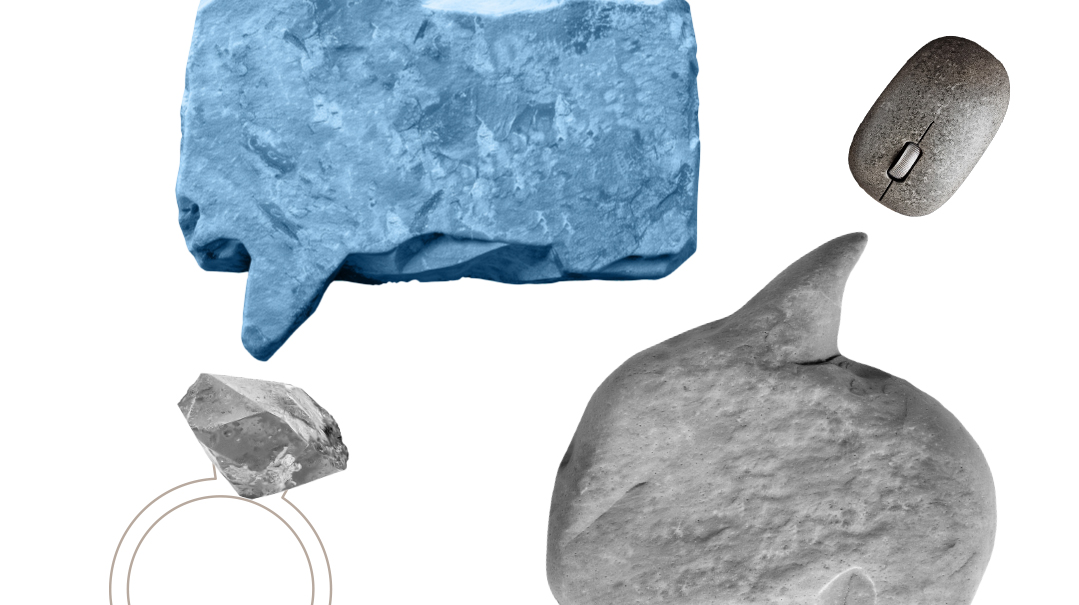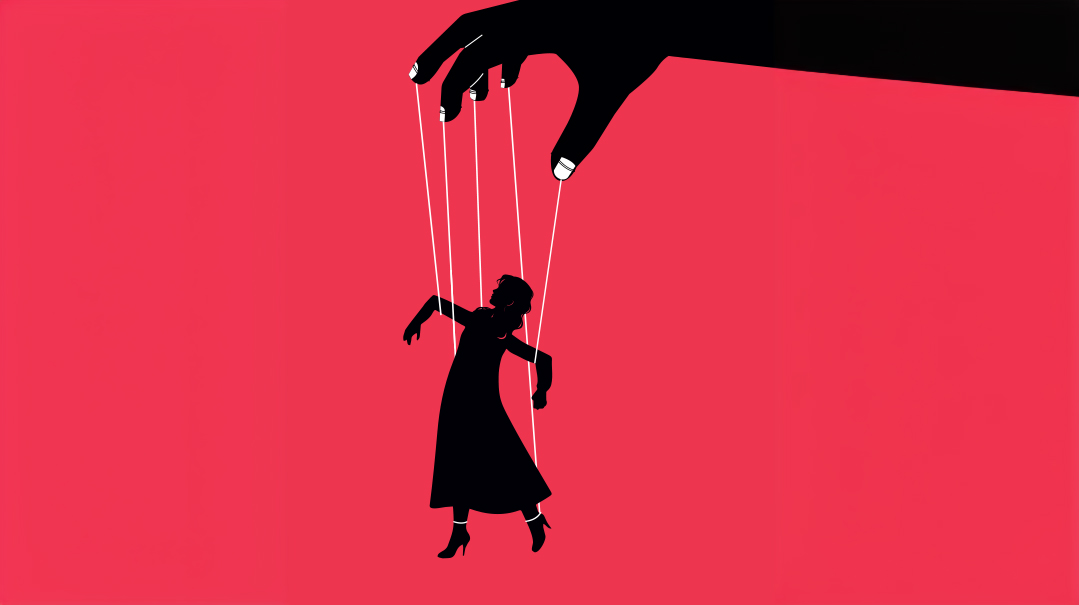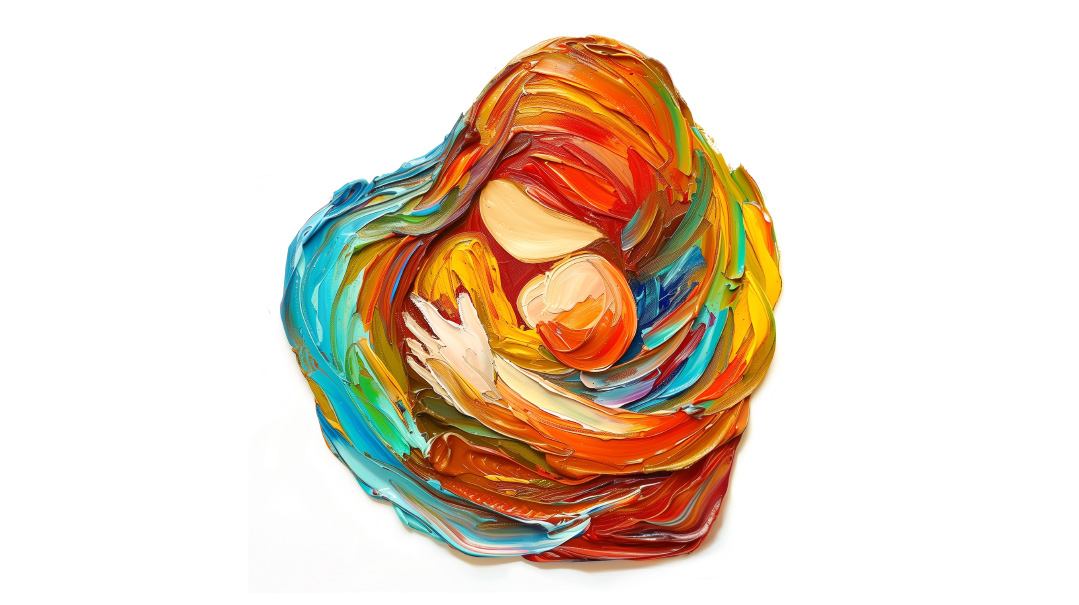At Home with Greatness

In the reminiscences of Rav Chaim’s daughters and his long-time neighbor we see other facets: the husband, the father, the man who cared for every Jew
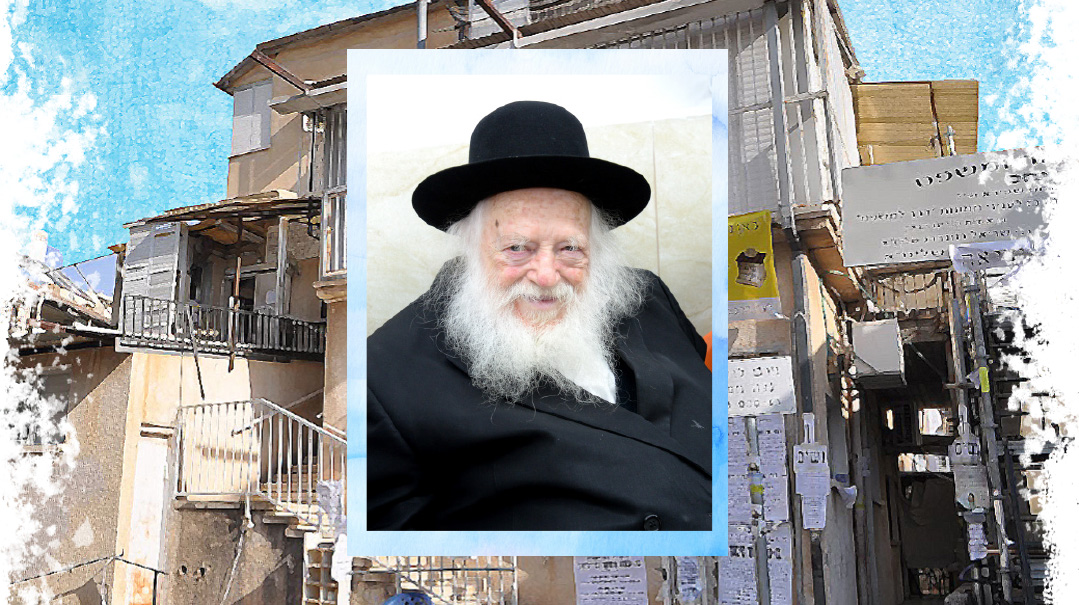
Towering tzaddik, master of all of Shas, baal mofes — there are many descriptions of Rav Chaim Kanievsky’s greatness, of the tzidkus the public saw.
The man who wouldn’t eat breakfast without his wife, who visited his married children when they were sick, who helped a novelist with the details of her story — in the reminisces of Rav Chaim’s daughters and his long-time neighbor we see other facets: the husband, the father, the man who cared for every Jew
Daughters of a Talmid Chacham
Sarah Pardes
A nation mourns its leader. Four women mourn their father. Rav Chaim’s daughters describe their childhoods in the Kanievsky home
“Our house was never a private home; it was always Klal Yisrael’s home. We never locked the door. Anyone could go in and out at any time to speak to our father or mother. Abba couldn’t disconnect from his learning, yet he dedicated a significant chunk of his time to Am Yisrael.”
I hear variations of this over and over from the four daughters of Rav Chaim Kanievsky ztz”l — tbl”c Rebbetzin Leah Koledetzky, Rebbetzin Ruth Tzivyon, Rebbetzin Dina Epstein, and Rebbetzin Bracha Braverman. (The fifth daughter, Rebbetzin Chana Steinman a”h, passed away years ago.)
The daughters are sitting shivah in the home of their brother, Rav Yitzchak Shaul shlita. Since Rebbetzin Kanievsky’s passing ten and a half years ago, he’s been living in the apartment adjacent to his father.
It’s Monday, the first full day of the shivah. Masses of women converge on the apartment to be menachem avel. But despite the numbers, the daughters are attentive to each person. Rebbetzin Leah Kolodetzky notices a group of young girls who’ve come with their teacher from Ashdod.
“When a great person passes away, his good middos are dispersed throughout the world, and each person can take upon one,” she tells them. “I suggest you adopt the middah of kibbud horim that he excelled at. Anything Abba’s parents told him was kodesh kodoshim.”
“In addition, it’s also worthy to be strict about davening three tefillos a day,” Rebbetzin Kolodetzky continues. “Abba said that although the Mishnah Berurah writes that women are only obligated in two tefillos — Shacharis and Minchah — it’s advisable to also daven Maariv. He always said that tefillah is emunah, and in our generation, we need lots of emunah.
“Of course, mothers of small children or women who work can’t spend too much time davening, but it’s still important to be makpid about tefillah. When you daven Minchah, it’s better to do it as early as possible, right after chatzos. If you push the tefillah off for the minutes before shkiah, you could end up missing the opportunity.
“Both Abba and Ima were very makpid about this, and they both passed away right after Minchah. If Ima would leave her tefillah for a later hour, it wasn’t the same tefillah.”
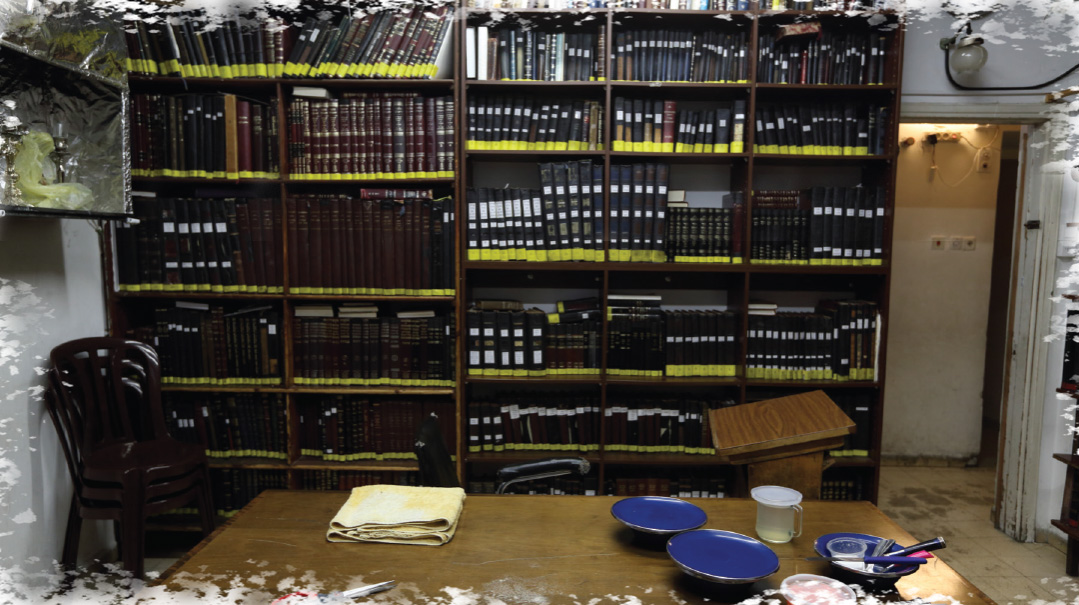
Respect in Another Realm
“When he was a child, and later a yeshivah bochur, his mother made sure to provide him with food,” says Rebbetzin Bracha Braverman. “She knew how immersed he was in his learning and that he was able to completely forget to care for his basic physical needs. Throughout the day, Abba always forgot to eat, but when he returned home, he made sure to finish all the food his mother had prepared, so she wouldn’t be worried about him.”
Once he was married, Rav Chaim would visit his mother every single day, even though every minute was precious to him. “Later, when she passed away, he’d visit his widowed sister, Rebbetzin Barzam shetichyeh, every day; she lives nearby, also on Rashbam street.”
Each visitor comes into the apartment and shares stories about brachos that came true, childless couples who were blessed, and ill people who were healed.
“Our father’s whole essence was learning Torah. All these stories occurred during small amounts of time he didn’t learn because he was helping the tzibbur,” Rebbetzin Dina Epstein remarks. “All the mofsim came from the power of his learning. ”
Says Rebbetzin Kolodetzky, “Abba didn’t know the streets of the city, except for the way from our house to his parents’ house. When Ima gave birth and he wanted to go to the grocery to buy bread and milk for the morning, he didn’t know where it was, even though it was just a few meters from the house. But when subjects relating to halachic calculations were presented to him, within seconds he could calculate the most complex things.”
“Our father’s ability to concentrate was astounding,” Rebbetzin Braverman recalls. “Neither of my parents ever asked us to be quiet when Abba was learning. We could jump and run around the dining room, jump on Ima’s bed when he was resting while holding a sefer; nothing disturbed him. People were amazed to see him going back to the same line in the Gemara after he reluctantly stopped to accept visitors.
“He went out to learn on the porch, even though the street below was bustling and noisy. His shtender was jostled all the time, but he didn’t notice. The only thing he asked us was to make sure the table was clear, so he could put his seforim on it.”
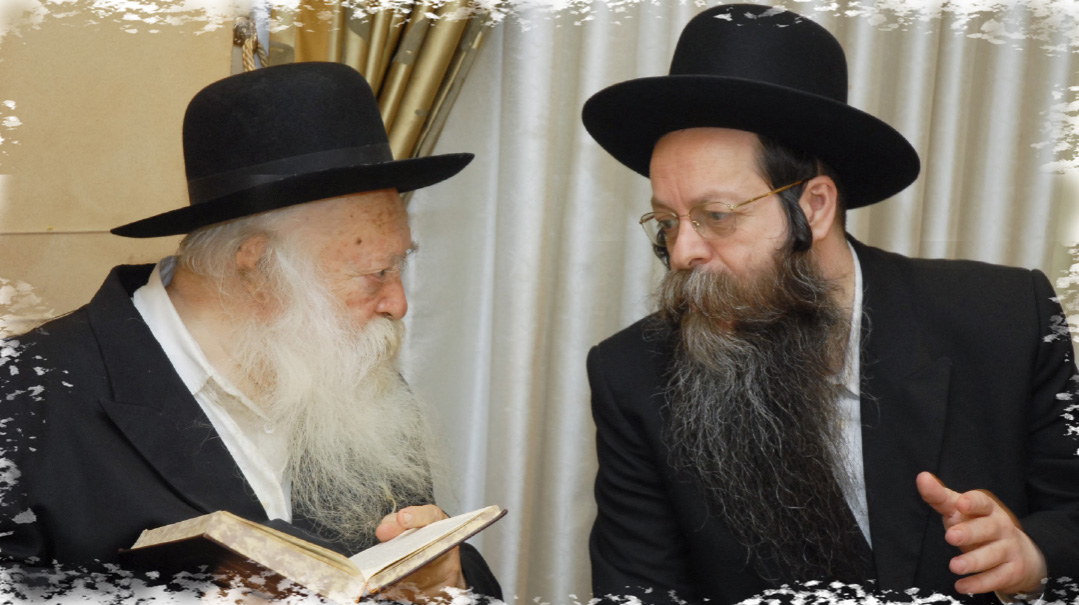
A Loving Father
When we touch on the topic of her father’s seforim, Rebbetzin Braverman remembers the fire that broke out in their home about 40 years ago.
“I was in high school. I lit a kerosene heater in the bathroom to heat it on a cold day. I went out for a minute, and when I came back I saw flames. I shouted and everyone came downstairs. Abba was worried about one thing: What would be with the copies of his sefer Derech Emunah, which hadn’t yet been distributed. Then he remembered he’d given a copy to Rav Dov Landau shlita, and he calmed down. He didn’t care about the house, which was burned, and the furniture that needed to be replaced.
“After the firefighters put out the fire, we saw that most of the house had been destroyed, along with almost all the furniture, but the seforim shelves that lined the walls hadn’t been damaged at all.”
“It was an open miracle,” Rebbetzin Tzivyon exclaims. “All the furniture in that room burned, but the seforim weren’t only undamaged, they didn’t even smell of smoke. But Abba just waved it all off.”
Nothing interested Rav Chaim beyond Torah learning. But despite his strict adherence to a schedule, his learning goals, his learning sessions and chavrusas, his daughters remember him as an exceedingly devoted father.
“Abba was a malach, but he was involved in our lives,” Rebbetzin Epstein says. “He checked our books and notebooks, and even wrote notes to the teachers. He’d learn constantly, but every so often, he would take a break and walk around the dining room, and on this little walk, he’d notice everything going on. He opened the door when our friends knocked, and invited them in or called us to come to the door.
“Every child who came to the house was treated very nicely. When Abba was asked questions, he always answered seriously, whether the person was young or old. Even in his final years, he knew there were many who sent him questions just so they could get a letter in response, but he still responded.
“When I was playing on the street, and he wanted me to come home, he didn’t hesitate to open the tris and call me up. When we went on school trips, he stood at the window and waited for us to come home. In truth, he was very afraid for us to go on trips, because it was potentially dangerous. But we really wanted to go. We involved our grandmother, who persuaded him to agree, because he listened to everything she said. But his agreement didn’t mean he didn’t worry.”
“When we were married and living in our own homes, if one of us didn’t feel well, he came to visit us,” says Rebbetzin Braverman. “We always said that Abba was the only person who, instead of using the phone to fulfill the mitzvah of bikur cholim came personally. Each day of Chanukah, our parents would visit a different one of us; that was in addition to regular Shabbos and Yom Tov visits.”
The daughters also remember the famous story about the grasshopper as an exciting childhood incident. “Abba was learning about the signs of taharah of grasshoppers, which led to his sefer Karnei Chagavim,” Rebbetzin Tzivyon remembers. “He sent me to a neighbor, who was a science teacher, to ask if she had a book with pictures of grasshoppers. She didn’t, and I went back upstairs feeling bad. But suddenly, we noticed a grasshopper on the windowsill. Abba was very happy, and said, ‘HaKadosh Baruch Hu sent the grasshopper especially for us.’ ”
Pesach with Calm
Pesach generates many memories for Rav Chaim’s daughters. They describe preparations that took place in a calm atmosphere, despite the small house — or perhaps because of it: There weren’t many items to clean….
“When we asked Abba to add a room to the house, he’d say: ‘What do I need it for? So I should have another room to bodek for chometz?’ When we came to Ima with the same request, her answer was similar: ‘Why? So that I should have another room to clean for Pesach?’ ”
“We only really began to clean on Rosh Chodesh Nissan,” Rebbetzin Braverman relates. “All the cupboards with seforim and the chometz dishes and utensils and clothes we weren’t actually using on Pesach, my father sold to a non-Jew. Before Pesach, he took out the seforim he wanted to learn from over Yom Tov, which we cleaned page by page. All the rest were put away.
“I remember how we covered the large bookcase with a special old sheet, which my parents bought right after they married. There was a drawing on the sheet of two people, and my father explained to us that they were the non-Jews guarding our chometz, and we weren’t allowed to touch them.
“We cleaned the kitchen on the last day, literally before bedikas chometz. The only meal we ate on the porch was supper on the night of bedikas chometz. The actual bedikas chometz took many hours, until about one in the morning. Abba would check the pockets of every garment, every toy and item that wasn’t sold to the non-Jew. My mother would stand next to him and reorganize everything when he was done. Only after bedikas chometz did he let us take down the Pesach dishes. They were beautiful sets that my mother had kept from her wedding.
“On Erev Pesach, Ima would get up at dawn, put on a special, clean apron, and grind the fish, fry onions, and peel lots and lots of potatoes. Naturally, she cooked very basic foods; no fancy salads or special side dishes. She worked very hard that day, and didn’t rest at all. Only in her later years did she take help in the form of the food that we sent. But at the same time, the stream of women seeking her advice kept her busy until literally the last minute before Yom Tov.
“Even at the peak of the pressure, she didn’t forget anyone. One of the neighbors related that they moved from Jerusalem to Bnei Brak a short time after their wedding. For Pesach, they planned to travel to their parents in Yerushalayim, and were very surprised when at lunchtime on Erev Pesach, my mother knocked at their door and gave them a full pot of cooked potatoes. ‘You’re traveling, so you probably don’t have what to eat,’ she said quickly before hurrying home.”
In earlier years, the younger children at home were at the Seder, along with some of the marrieds. “In recent years, it was too much to have almost everyone, so each child ‘booked a slot’ to come with their children and grandchildren on a different Yom Tov. My husband and I merited to come on Seder night,” relates Rebbetzin Braverman.
“My father was very strict about the zmanim. We began the Seder right after Maariv and finished everything before chatzos. I don’t remember the Seder being particularly long. At Shabbos seudos as well, and on other Yamim Tovim, we ate, sang a bit, said divrei Torah, and then he went back to learn. Only Mah Nishtanah took a long time, as each grandchild and great-grandchild asked it separately.”
The mitzvah of maror got special attention. “My father ate sharp chrein, not lettuce, and he didn’t let us open the container on Erev Pesach, so that the sharpness shouldn’t evaporate even a bit. Everyone ate a k’zayis, but he kept eating more, to be yotzei the obligation with hiddur, despite the fact that his face became red as a beet. He coughed and choked, and it was very hard for him.
“The most powerful experience of this great night was when my father said Betzeis Yisrael for about half an hour, and he rolled his eyes Heavenward until those next to him saw only the whites of his eyes. He looked like he was in a different world completely. It was very out of character.
“A few years ago, the mystery around this song was somewhat resolved. Rav Shapiro, the grandson of the Netziv of Volozhin, came to visit my father on Pesach, and began to sing Betzeis Yisrael with that same tune. He then explained that their family had a tradition that the Gra himself composed this special tune.”
The memories continue flowing. “When we were children, we ate hand matzos only on Seder night. The rest of the days we ate machine matzos and even gebrochts. In recent years, my father ate only hand matzos for all of Pesach. He baked the matzos on Rosh Chodesh Nissan, in a chaburah, and he came himself to the baking, from the beginning to the end, checking and supervising.
“My grandfather, Rav Elyashiv, used to eat machine matzos because he thought they were more mehudar, but after my father convinced him to eat hand matzos, he agreed, on condition that Abba would be the one to supervise their preparation. And that’s what happened. My father took the first batch for himself, and the last batch, at about three in the afternoon, for his father-in-law.
“Regarding other foods, my father wasn’t strict with us, and we ate all products that were under the strictest kashrus supervision, including fruits and vegetables with peels, and fish. My mother preferred to prepare lots of things at home and was strict not to eat potato starch.”
The Virus Weakened Him
A year and a half ago, on Succos 5781, Rav Chaim contracted corona. The Jewish world worried deeply for his welfare. He was treated at home by top doctors, and Am Yisrael breathed a sigh of relief when they were told that Rav Chaim had recovered.
But there were things that weren’t publicized.
“Even after recovering from corona, Abba didn’t completely regain his strength,” Rebbetzin Tzivyon says. “He was much weaker, even though his mind was clear until his final minute.”
“In the past two weeks, his weakness significantly worsened,” Rebbetzin Braverman adds. “He fell asleep often, even though the doctors could see no apparent reason for that. He had all kinds of tests done, but the results came back normal. In recent days, it was harder for him to breathe, and on the advice of his doctors, he was administered oxygen at home. We weren’t particularly worried, because there had been such incidents in the past, and he got back to himself.”
“On Purim,” Rebbetzin Tzivyon relates, “he did all the mitzvos of the day, although he was very tired and kept falling asleep. That was the last time we saw him. On Friday, his breathing became heavier, and the doctor advised us to increase the oxygen we were giving him. But he collapsed and within a few moments, he’d passed away. It was a misas neshikah, like plucking a hair out of milk, as it says of tzaddikim.”
Open the Door to Mashiach
Rebbetzin Tzivyon relates that on Sunday, a short time after the massive levayah, their newest grandson had a bris. He was the first of the grandchildren to be named Shmaryahu Yosef Chaim. “The bris was supposed to be on the Tuesday before Purim, but it was postponed because the baby didn’t feel well. In retrospect, he was clearly destined to carry this name.”
Rebbetzin Tzivyon explains that her father didn’t leave a will — and that wasn’t because his passing was sudden. The Chazon Ish didn’t leave a will, nor did the Steipler ztz”l. Rav Chaim didn’t feel it right to do something his ancestors had not done.
“Both the Chazon Ish and the Steipler passed away on Shabbos,” she adds. “But they had their levayahs postponed until Sunday, because of kevod HaTorah. In this case as well, the psak was to move the levayah to Sunday, for the same reason, and also to avoid mass chillul Shabbos [by security forces.]”
“Abba wrote that the best time to depart This World is on Erev Shabbos or on Motzaei Yom Kippur,” Rebbetzin Kolodetzky marvels. “And he merited to have both of these times. He passed away on Friday, and on Motzaei Purim, which is on a higher level even than Yom HaKippurim.
“Miraculously, the levayah passed peacefully,” Rebbetzin Kolodetzky says. “There was a lot of fear after Meron. We sat at home and davened the whole time that Abba’s zechus should protect everyone and that nothing tragic should happen. In addition, the weather was perfect: It wasn’t raining, nor was it too hot or too cold.”
I ask if Rav Chaim foresaw his passing, or spoke about the coming of Mashiach. Rebbetzin Tzivyon shared that her father always said that Mashiach is already here, but we’re not opening the door to him.
“There’s no doubt that Mashiach is close,” Rebbetzin Kolodetzky concludes our long conversation. “Abba wanted to hasten his arrival, to help the Geulah come more quickly. He was the heart of Klal Yisrael, the Urim V’Tumim of us all. As we know, ‘tzaddikim are greater in their passing than in their lifetime.’ In a situation where we have no one left to rely on — that’s a sign that the Geulah is in the offing. The main thing is that we should deserve it.”
Behind Every Great Man…
The daughters of Rav Chaim speak about the special relationship between their parents.
Throughout the hours of conversation with Rav Chaim’s daughters, what emerged clearly was the special bond between Rav Chaim and Rebbetzin Batsheva Esther a”h.
“At first, my mother refused the shidduch, afraid the bochur was disconnected from the world in a way that would preclude a normal life,” one of the daughters notes. “In her generation, most bochurim shaved, and he had a beard. My mother was a talented girl, with yichus and wisdom, and she was nervous.
“But when she got a clear promise from the Chazon Ish and from her father that her husband would be a gadol hador, she was calmed. She helped her husband immerse himself in Torah undisturbed.”
When the young couple married, Rav Elyashiv gave his mechutan, the Steipler, a gift — the shtreimel that had been worn by his grandfather, the Leshem. The Steipler cherished the gift, and made sure to wear it each Shabbos at Shalosh Seudos. Later, he gave it to his son, Rav Chaim, and he wore it for Shalosh Seudos and on Yamim Tovim.
He Didn’t Recover from Her Passing
On Thursday, 7 Kislev 5712/1952, Rav Chaim and Rebbetzin Batsheva Esther were married. After living in a few temporary locations, they moved into a small apartment on Rashbam Street, which at the time had two rooms — a bedroom and a dining room — and a kitchen shared with the neighbors.
All the eight children born over the years slept in that living room, in addition to the many guests that the family hosted. At the same time, Rav Chaim sat and learned at the only table in the house most of the day. Years later, the family got their own kitchen, and when the stream of people coming left no choice, two additional small rooms were added to the apartment to enlarge it slightly.
The thousands who visited this home emerged awed by the simplicity and modesty. The walls were peeling, the cement was chipping. The shades were missing slats and the simple furniture was never changed. The Rebbetzin lit Shabbos candles for the 60 years of her marriage on a piece of disposable aluminum foil, in little tealights, instead of silver candlesticks. The chairs were simple, the shtender was unpainted and worn. But the home radiated joy.
“Rav Chaim’s Torah is my pieces of jewelry,” the Rebbetzin once told a neighbor. “Aside for that, I need nothing else. Not even candlesticks for Shabbos.”
“Abba passed away exactly ten and a half years after Ima,” Rebbetzin Kolodetzky notes. “They both passed away on the 15th of the month, a few minutes after Minchah. They were both taken suddenly, as they hadn’t been ill, and there was no chance to daven for them.”
“After Ima’s passing, Abba didn’t return to himself,” Rebbetzin Tzivyon says. “He was dependent on her, and was worried about who would take care of his needs from that point on. Of course, we didn’t leave him for a moment. But something in his natural joie de vivre dulled. Rav Gershon Edelstein shlita remarked after Ima’s passing that there had never been such a woman and there never would be.
“When I wrote my book, Beis Imi, about my mother, my father pointed out that he’d asked me to write a book about Ima, not about him. But it’s impossible to write about her without mentioning him, and now, as well, it’s impossible to separate them.”
A Shared Meal
“When Abba came home from kollel, the food was ready on the table,” Rebbetzin Dina Epstein relates. “As busy as she was, Ima never served his meal late. He wouldn’t eat without her. If she wasn’t there, he sat and learned until she arrived. They ate breakfast and supper together every day through the years. He wanted her to sit and eat and not get up until after she bentshed. He knew very well that she was so busy, that without this, she’d never find time to eat.
“Abba scrupulously adhered to sleeping times and eating times. Every moment was calculated and utilized. There was a neighbor who’d set her clock based on when she saw Abba and Ima sitting down to eat supper.”
Rebbetzin Bracha Braverman remembers another anecdote. “It was my job to make sure that Ima went to rest in the afternoon. One time I came home from school late, which meant she went to sleep later. That day, Abba sat down and wrote a note to my teacher: ‘Please dismiss Bracha ever day at one o’clock so that she can make sure her mother goes to sleep.’
“Of course, I didn’t give the note to my teacher. I was embarrassed. But I knew from then that this was my job, to make sure Ima rested.”
The Rebbetzin was famous for receiving people. From early morning until late at night, her home was filled with women and girls, frum and secular, baalos teshuvah and those who were growing stronger. They were all her daughters, and the Rebbetzin never turned anyone away. She never tired of listening, and answering each one with what she needed. Often she was asked to ask Rav Chaim for a brachah, and she did so.
But this affected her health, and a short time before her sudden passing, she was hospitalized for excessive weakness. When she was released, she was warned not to receive the public, but she couldn’t stand that order. The daughters describe how she walked around sad and dejected, as she looked out the window at the women who had gathered, but who couldn’t come in.
“Abba decided to restore things to the way they had been,” Rebbetzin Kolodetzky relates. “The next day, Dr. Moshe Rothschild of Mayanei Hayeshua came for a home visit to make sure Ima was resting. He saw the masses of women and complained to Abba: ‘Why doesn’t the Rav take care of her?’ My father apologized and said that without the people, she felt much worse.
“When Ima passed away, it was so hard for him; he wanted to preserve the tradition of having an open-door policy, and asked me to see the women in her place. I’d convey every question to him, without thinking twice. Today, there are names for tefillos that have accumulated, but I have no one to give them to.”
Rebbetzin Kolodetzky comments on how many women who visited the house were astounded at the simplicity. “A group of girls once came from a school for baalos teshuvah. The woman who brought them asked Ima to tell them about being mistapek bemuat, but she didn’t understand what they were talking about.
“I have everything; how can I speak about a challenge that I don’t face?” she wondered. She went with the girls from room to room, and showed them how she had a refrigerator, an oven, a stove, a table and beds. “I cook food each day, full pots, in my own kitchen; what do I lack?”
A Drawer for Each Child
Rebbetzin Kolodetzky describes how her parents refused to put air-conditioning into the house for years. “My mother would cook in the tiny, steamy kitchen and never claimed she was hot or cold. She said the sweat that accumulated while cooking food, especially Shabbos food, would be the tal of techiyas hameisim for her. Only when we told her that the woman who helped her with the housework suffered from the heat did she accede.”
While the men who came over the years to learn with Rav Chaim feasted their eyes on the very old bookcases and the small, aging table, the Rebbetzin welcomed the women who came to her in her tiny kitchen. It had two sinks, an oven and a gas stove, all of which were ancient, and a table with three legs that leaned on the wall. Even the old fridge, which had been fixed many times, was put in the bedroom, due to a lack of space.
It wasn’t possible to talk to the Rebbetzin about a new refrigerator, or an oven that worked better and would help her better handle the heavy workload of the household. When the discussion came up of leaving the Pesach oven out for the whole year, the Rebbetzin objected. Right after Yom Tov ended, she quickly put the oven away in its special place, so no one should use it to replace the old one.
“There was once an American philanthropist who pleaded with Abba to add another room to the house,” Rebbetzin Braverman says. “Abba claimed there was no need, so the man decided to appeal to Ima. She also didn’t understand why they needed another room. As a last resort, the man turned to us, the children. But we also didn’t feel that we lacked anything. Each one had a bed, a shelf in the cupboard, and even a drawer. We were happy and never felt that we lacked for anything.”
Rebbetzin Braverman says that as part of her histapkus bemuat, her mother never wanted to accept gifts. “During the time that I worked, and she was still relatively available, she watched my young children at home, without any remuneration of course. Before Purim, I wanted to buy her a gift, so I bought her warm boots, because her old pair had torn. But when I gave her the gift — which cost me a quarter of what a babysitter for a month cost — Ima didn’t want to accept it. She cried, and only after a long time did she start wearing the boots, thanking me for them at every opportunity.
“In another case, we bought her a food processor, after the old one was so broken down that it needed constant fixing. Then, too, she really didn’t want to accept the gift. The food processor sat on top of the fridge for a long time until the old one completely stopped working. We also bought my parents mattresses, but we had to apply a lot of pressure and persuasion for Ima to agree to use them.” The people who took nothing gave everything.
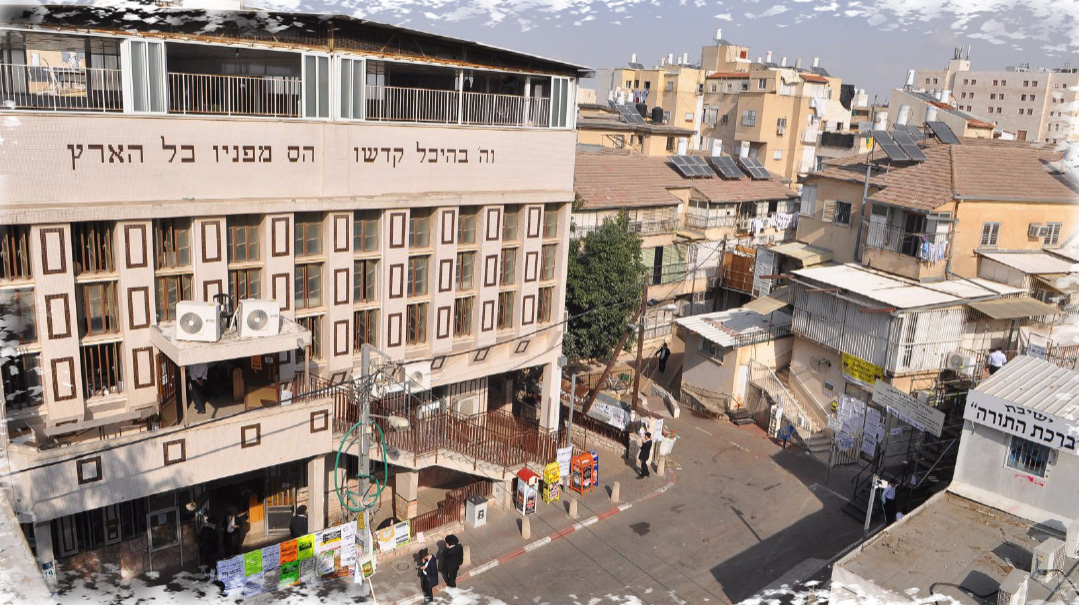
A Good Neighbor
Malka Schaps
ON the famed Rashbam Street in Bnei Brak, the location of Rav Chaim Kanievsky’s ztz”l Spartan apartment, we celebrate Shushan Purim as well as regular Purim. There’s a possibility that the ancient city of Yaffo nearby was surrounded by a wall at the time of Yehoshua, and that Bnei Brak is close enough to be considered a suburb of Yaffo. Megillas Esther is read at Rav Chaim Kanievsky’s house and in the Lederman shul next door, without a brachah, and we eat a small festive seudah and send a few mishlochei manos.
Purim and Shushan Purim are always busy. This year it was all the more so because Shushan Purim was on a Friday, and we were planning to travel to our son Eli’s house in Petach Tikvah for our first Shabbos away since Covid hit.
But then v’nahafoch hu — everything was turned upside down. Another son called to ask if the rumor that Rav Chaim had passed away was true. I had no idea; I went to the window facing Rashbam Street and saw everyone in sight walking with a sense of urgency in the direction of Rav Chaim’s house, half a block down.
That didn’t bode well.
A minute later, my husband walked in and said, “Baruch Dayan HaEmes.”
No!
It couldn’t be!
I choked up in sorrow.
We hovered uncertainly, not knowing when the funeral would be, distracted from grieving by all the practical considerations. Memories of previous Kanievsky funerals flooded me. Rebbetzin Kanievsky had passed away on Shabbos Chol Hamoed Succos 11 years before. I still remember the shock I felt when I heard the announcements about her funeral. I’d burst into tears in the middle of davening Shemoneh Esreh. The Steipler, Rav Chaim’s father, had passed away on Shabbos and the funeral was put off until Monday.
As Shabbos drew closer, a neighbor informed us that the funeral would be held on Sunday. Quickly, we threw our packages and suitcase into the trunk of the car and set out, forgetting to take my husband’s tallis and the challahs from the freezer.
A Friendship Begins
We’d known the Kanievskys for more than 40 years, ever since we moved to their neighborhood and started davening at the Lederman shul next to Rav Chaim’s house. I was introduced to the Rebbetzin by a friend.
After I wrote my first novel, A Time to Rend, A Time to Sew, in 1981, I was worried about the consequences of publishing a frum novel for adults. I wondered if it might affect my children’s shidduchim, or impact the way my husband was respected in the beis medrash, or influence how serious a mathematician my employers would consider me.
Rebbetzin Kanievsky encouraged me to go ahead, and pointed out that I didn’t have to put my real name on it. She told me Rav Chaim published his many books with a string of initials standing for Shmaryahu Yosef Chaim ben Harav Hagaon Yaakov Yisrael. So, I picked a pen name and began the search for a publisher.
In my novels, the character Rebbetzin Margulis is modeled on Rebbetzin Kanievsky, Rav Margulis is usually Rav Shach or Rav Elyashiv, and often the “psak” my characters receive is one that we or friends of ours received in a similar situation.
At the time, Rav Chaim was one of the roshei kollel at Kollel Chazon Ish. The Rebbetzin sold eggs from the house, dealt with people who came to buy Rav Chaim’s books, and babysat for her grandchildren in the mornings.
I started joining the Rebbetzin at Rav Chaim’s vasikin minyan in the Lederman shul. The shul was unheated, but the Rebbetzin’s warmth compensated for the cold. On Shabbos it was also gloomy, because the Lederman shul, like the Rav and Rebbetzin’s home, had only gas-light rather than a Shabbos generator. In order not to use water pumped with electricity, there was a water tank on the roof, and in Rav Chaim’s house they washed with water from a large green plastic tub.
In those long-ago days, there were only four other ladies in the women’s section at sunrise; today there are 40. I remember old Mrs. Lederman coming down from her apartment above the shul to daven with us. When Mrs. Lederman passed away in 1983 and willed her apartment to the shul, they tore off the roof to build the second floor, and we used to pick our way through puddles of rainwater to get to our seats.
Rebbetzin Kanievsky davened in the corner closest to the Aron Kodesh, and Rav Chaim davened behind a pillar near the bimah. The Rebbetzin’s father, Rav Elyashiv ztz”l, insisted that his daughters lift the curtain to see the Torah when it was raised during hagbah. The Rebbetzin told me that once when she was a girl, some outraged congregant brought a book down on the Rebbetzin’s little hand when she lifted the curtain. She reported this to her father in tears. He insisted that she continue lifting the curtain, and we women in the shul do so even today. That’s how I know where Rav Chaim used to stand.
Coffee and Concern
Back in the early 80s, Rav Chaim gave a shiur in his house after Shacharis. If I had a question or a worry, I’d go home with the Rebbetzin from shul to talk to her. She’d cut me a couple of pieces of cake and pour me a cup of coffee. Then she’d prepare hot drinks in assorted cups and mugs for the members of the shiur. This one liked coffee without sugar, and this one with milk. Another wanted tea.
She’d carry the tray of hot drinks into the room where they learned (which served as the dining room on Shabbos) and set down the right cup next to each of the learners. Only then did she come back to pour herself a cup of coffee and answer my questions.
The Rebbetzin would wait with breakfast until Rav Chaim finished the shiur, because he always preferred to eat with her. Years later, when my son Eli, with whom they were close, would visit us occasionally in the evening, she’d invite him over, saying, “Chaim and I are having dinner now. Would you like to join us?” He’d sit with them, but was embarrassed to eat anything.
The Kanievskys’ front door was a sliding door; it was usually open. A closed door was a sign that the Rav and Rebbetzin were at shul. I remember that once a thief walked in and took money on deposit for some charity. We were all astounded that anyone would be so brazen.
I was at the Kanievskys fairly often, enough that when my husband once came in and Rav Chaim asked, “Who’s our guest?” the Rebbetzin answered, “Malka’s husband.” A few years later, she probably would have said, “Eli’s father.”
“Your Mother’s Page”
My son Eli merited to have Rav Avraham Yaakov Zilberstein, the oldest son of Rav Yitchak Zilberstein, Rav Chaim’s brother-in-law, as his tutor (Rav Chaim and Rav Zilberstein were married to sisters, daughters of Rav Elyashiv). It was through his connection to Rav Avraham Yaakov that Eli became close to Rav Yitzchak and Rav Chaim.
Once when Eli asked Rav Chaim a question, Rav Chaim said to him, “Why are you asking me? I’m not a posek. You’re close to my brother-in-law, Rav Yitzchak. You should ask him.”
My second book was true stories of Holocaust survivors. In one of the stories, the Gestapo condemned a talmid chacham to be shot. Before his execution, he told the men of his village to put a knife in his grave. Needing to verify that there was a basis for such a practice, I went to the Rebbetzin, who asked Rav Chaim if he’d ever heard of such a thing. He gave me a source for burying a knife in a martyr’s grave.
Many years later, I was able to return the favor. For his book HaShekel HaKodesh, Rav Chaim needed some trigonometry and asked one of his close followers to learn the necessary mathematics. Rav Chaim wanted to include a table of sines and cosines in the appendices, and knowing I was a mathematician, Rav Chaim asked the Rebbetzin to get it from me.
A year ago, when Eli visited him, he opened the sefer to the last page and said, “Here, this is your mother’s page.” Another time he told Eli, “When your father was in aveilus for his parents, I enjoyed how he davened so loudly and clearly. I was sure I heard each brachah.” When Eli was hospitalized for a gall bladder operation, Rav Chaim came to visit him in the hospital.
Once the Bostoner Rebbe asked us to find him someone who could do a computer search of the Gemara for all cases of one person giving a blessing to another. We found such a person, the son-in-law of a local rosh yeshivah. He explained to us how such searches work.
“First, we do a computer search and produce a list. Then we take it to Rav Chaim and ask him if we missed anything.” Rav Chaim inherited his phenomenal memory from his father, the Steipler Gaon.
For many years I attended a weekly class on Navi, taught by Rebbetzin Ruth Yaakobson, who in her girlhood had been friends with one of the Steipler’s daughters. Once, the girls had to find some obscure places in the atlas as geography homework.
“Let’s ask Abba,” suggested Rav Chaim’s sister.
“Why would he know the map coordinates of some islands in the Pacific?” asked her friend.
“Sometime, when he’s exhausted from learning, he reads the index of the atlas as a change of pace.”
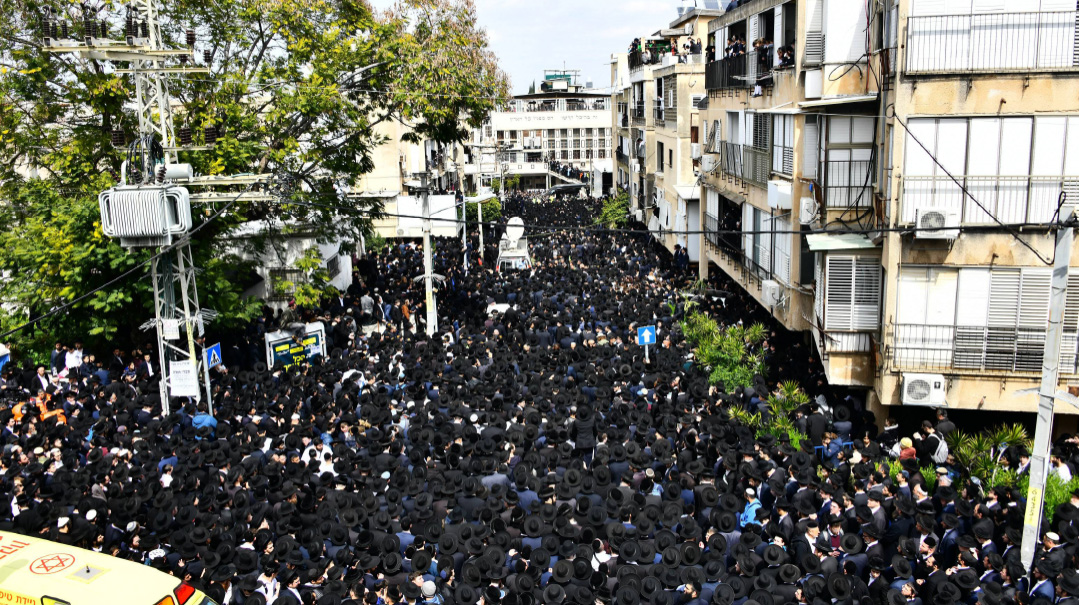
A History of Connection
On the morning of the levayah, we set out to daven in the Lederman shul as usual. I met women returning, having been told that the women’s section was closed. My husband continued on and was told by a policeman, “I know it’s a regular minyan and you daven here every day, but there’s no more room.”
A chassidic bochur pulled my husband’s sleeve and said, “Come with me.” He led him through the courtyard of the building where the Gerrer Rebbe used to live, and borrowing a chair from the entrance to the building, helped my husband climb over the stone wall separating the courtyard from the path leading to the women’s section, from which there’s also access to the men’s section.
After three quarters of a century, it was a little late in life to start climbing over shoulder-high stone walls in tallis and tefillin, but it was for a good cause. It reminded us of the Steipler’s funeral 34 years ago, which started from across the street. Rav Shach stood on the upper balcony of the Lederman shul and declared, “We are orphans. We have to remember that every orphan has an Eternal Father. We have our Father in Heaven.”
After the Steipler passed away, the lives of Rav Chaim and the Rebbetzin changed drastically. Until then, Rav Chaim spent all his time immersed in learning, while the Rebbetzin ran an open, busy, but still private home. Now, everyone who wanted a blessing or advice or a sandek for his son’s bris came to Rav Chaim’s door. Rav Chaim would be driven from bris to bris, while someone would pull out requests for a blessing from a bag and read them to him.
The women quickly discovered that Rebbetzin Kanievsky was a personality in her own right, and during her reception hours, her house became very crowded. She’d bring women home with her from the vasikin minyan, and if her foyer was still crowded with women when it was time for Minchah or Maariv, she’d take them with her to the shul. I stopped coming to her house, not wanting to add to the Rebbetzin’s burden, though I did still see her in shul and in the street.
Once, about 30 years ago, I was under a lot of pressure at work and was considering stopping to bake challah every week. I ran into the Rebbetzin on Rashbam Street, and she told me that even in a time of stress, I should maintain the good practices that I had.
Rav Chaim was the Steipler’s oldest child, and every year at the Siyum Bechoros on Erev Pesach, he’d make a siyum on the entire Shas. The Rebbetzin would bake six cakes to distribute to the first-borns who came from all over the city for the siyum.
One year Rav Chaim had a stroke after Succos and was hospitalized for a number of weeks. That Pesach we wondered if perhaps there would be no siyum, but indeed there was. A friend of ours who was close to Rav Chaim said that on the first day after the stroke, he couldn’t learn, but the following day he was already studying his seven-and-a-half pages of Gemara.
Rav Elyashiv lost his Rebbetzin shortly before my son Eli went to Yerushalayim for yeshivah. Bochurim in Eli’s yeshivah who knew Eli was close to Rav Zilberstein would bring him their questions all week, and on Friday, when he came back home to Bnei Brak to visit us, he’d meet Rav Zilberstein and ask him the questions.
Afterwards, Eli would sometimes accompany Rav Zilberstein to Rav Chaim’s, where the two brothers-in-law learned together for an hour, a chavrusa that lasted for over 50 years. Rav Zilberstein would say that that chavrusa gave him strength for all the rest of the week.
Eli would return to Yerushalayim in time for Shabbos. He’d eat Seudah Shlishis at Rav Elyashiv’s and ask him the questions which Rav Zilberstein was unsure of the answers. After Shabbos, Eli would write up the answers for the bochurim, and would end the evening by having a Melaveh Malkah with Rav Elyashiv’s son-in-law, Rav Azriel Auerbach.
Since Rav Elyashiv’s children took turns spending Shabbos with him, Eli got to know the entire family. Afterwards, he would report to Rebbetzin Kanievsky, who had no phone in her house, what was new with her family.
When Eli decided he was ready to get married, he went to Rav Chaim, who gave him a brachah that he should have an easy time in the “parshah” and be zocheh to a good shidduch. Within a month, he went out on his first date, and they got engaged five days later. An easy shidduch indeed!
My husband and I weren’t so sure it was all a result of Rav Chaim’s blessing. Two months earlier, we ourselves had been to Rav Elyashiv, after first checking with an outreach expert, to ask about possibly promoting the Hebrew translation of A Time to Rend to the secular market. The Rav asked what would be the problem. My husband said that we were worried that it might adversely affect Eli’s shidduchim.
“Eli,” said Rav Elyashiv with confidence, “will get a good shidduch.” That was all we needed to hear.
At the same time, the kallah and her mother went to Rebbetzin Kanievsky for a brachah. “You know,” said Rebbetzin Kanievsky, “they say that learning two halachos of shmiras halashon every day is a good segulah.” That night, the kallah’s mother read two halachos to her daughter, and the next night, her daughter read two halachos to her mother. The night after that, the shadchan called up and suggested the shidduch with Eli.
There for Everyone
Twelve years ago, a magazine requested that I check out a rumor that Rebbetzin Kanievsky lights a Chanukah menorah. It seemed unlikely to me, but I agreed to ask. After davening, several women with serious problems crowded around the Rebbetzin, and I almost gave up, but her assistant, Miriam, said, “You still didn’t get to ask your question, right? Why don’t you come up to the house?”
It had been a long time since I’d been there, but once again I was seated in the same small kitchen while the Rebbetzin told the story of her Chanukah menorah.
A generous donor gave Rav Chaim a sterling silver Chanukah menorah. Rav Chaim preferred to continue lighting the much simpler menorah that the Rebbetzin’s grandfather, Rav Aryeh Levine ztz”l, had given to him when he was a chassan, but he didn’t want to offend the donor, so he asked the Rebbetzin to light the new menorah. After she was yotzei the mitzvah when Rav Chaim lit, she’d light the new menorah without a brachah. Some of the women from the shul would come to see her light.
I thanked her for the story and looked around the crowded kitchen. “It’s been a long time since I was last here,” I said. With a sigh, the Rebbetzin said, “My house isn’t my own anymore.”
One more “Rav Chaim story” before we close. Two years ago, a woman was having a complicated birth. The baby was badly positioned, and the doctors thought that an operation might be necessary.
The laboring woman’s husband asked Eli to take her name to Rav Chaim. Rav Chaim thought about the situation and then said, “It’s the month of Adar. V’nahafoch hu. Everything turns upside down. It will be all right.”
The woman had a completely normal birth, without any need for medical intervention.
For us on Rashbam Street, and for all of Klal Yisrael, this year Shushan Purim turned from a holiday to a day of mourning. We’re waiting for the day when sadness will turn to happiness for all members of the nation.
(Originally featured in Family First, Issue 789)
Oops! We could not locate your form.

